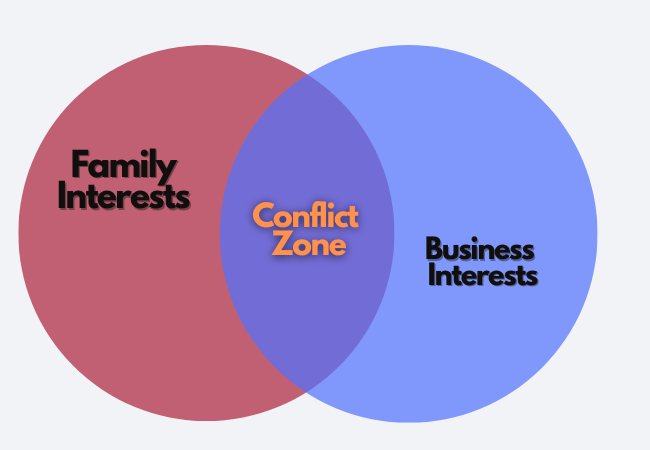 Blog
BlogHow to manage conflicts in a family business
The following is a summary of an article taken from la Revista Economista N°45, written by Pedro Juan Martín, María Reyes Lozano Piñero and Francisco Javier Corbalán Berná, in which they analyse how to deal with the conflicts that can arise in family businesses.
Challenges facing family businesses
As can be guessed, the family business faces unique challenges due to the overlapping interests between the family and the business. The family business often tends to have emotional and affective relationships that are intertwined with business objectives, which can lead to tensions.
In an environment where family values and business culture are intertwined, conflicts often arise due to unclear roles, poor communication and power struggles within the family business.
The key to balance: Family and business
One of the biggest challenges facing a family business is maintaining the balance between family well-being and efficient business management. While the family seeks harmony and stability, the business is geared towards profitability and sustainable management. This balance is essential to avoid the emergence of conflicts that could compromise the stability of both systems.

Causes of conflict in family businesses
Roles and responsibilities: Pillars for stability
The lack of clarity in roles is one of the main causes of conflict in this type of business. Family members often fail to separate their personal and business responsibilities, leading to confusion and tension.
It is essential that business families establish a family protocol, managed by a human resources department outside the family, to regulate how decisions are made and responsibilities are distributed.
The two-system model
The two-systems model, proposed by Taguris and Davis, explains how the overlap between the business fabric and the family can create a zone of conflict. The greater the interaction between the two systems, the greater the likelihood of tension. To avoid clashes, it is essential to set clear boundaries and respect roles within the family business.

Solutions: How to prevent conflicts
A key tool for conflict prevention in a family business is the creation of a family council and the strengthening of corporate governance. The family council is a governance body that facilitates communication and anticipates problems before they become crises.
Additionally, the use of a governing agreement can define the rules of succession for the next generation of the family and family ownership in the business.
Emotional intelligence in senior management
Developing emotional intelligence in senior management is critical to managing conflict within the company. Skills such as empathy and self-control allow a better understanding of family and business problems, promoting more effective business management and social responsibility.
Tax Benefits in Family Businesses
Another crucial aspect for the success of a family business is to take advantage of the tax benefits offered by the current tax regime. Family businesses can benefit from reductions in wealth tax and inheritance and gift tax.
Moreover, in regions such as Castilla y León, tax incentives are promoted to encourage generational handover and business continuity.
Impact on communication and social networks
The management of internal and external communication in family businesses also plays a vital role in conflict prevention. Social networks are a key tool for disseminating family business culture and strengthening social capital.
As is common in this type of business, through a well-optimised website, family companies can showcase their values and their commitment to a sustainable way of doing business.
Family businesses must effectively manage conflicts arising from the interaction between the family and business systems. Tools such as family protocol, emotional intelligence, and the correct planning of generational handover are essential to ensure the continuity and success of the company.
Read the full article HERE and if you want to know more, Pedro Juan Martín and María Reyes Lozano can be your teachers if you are studying a master's degree at ENAE Business School.














